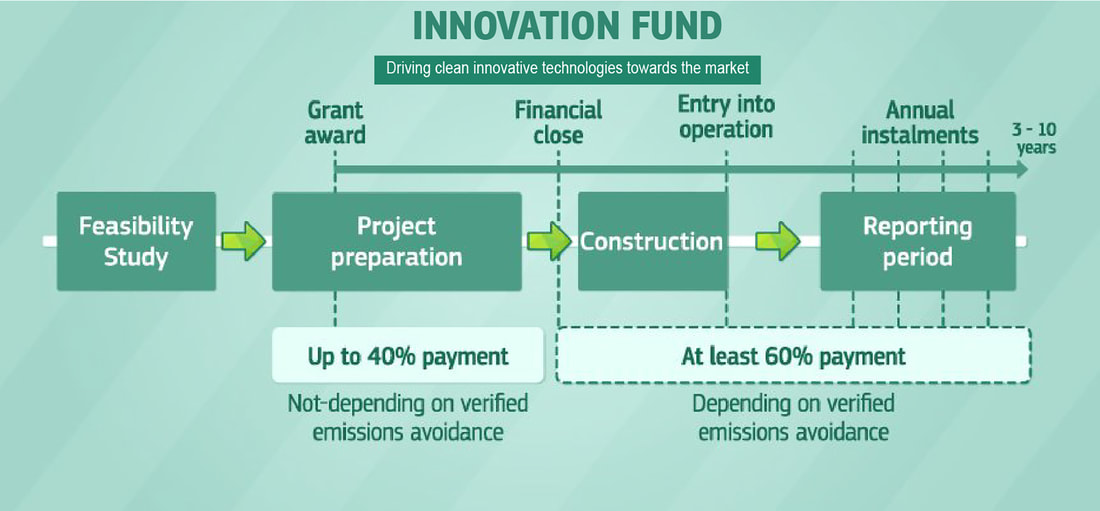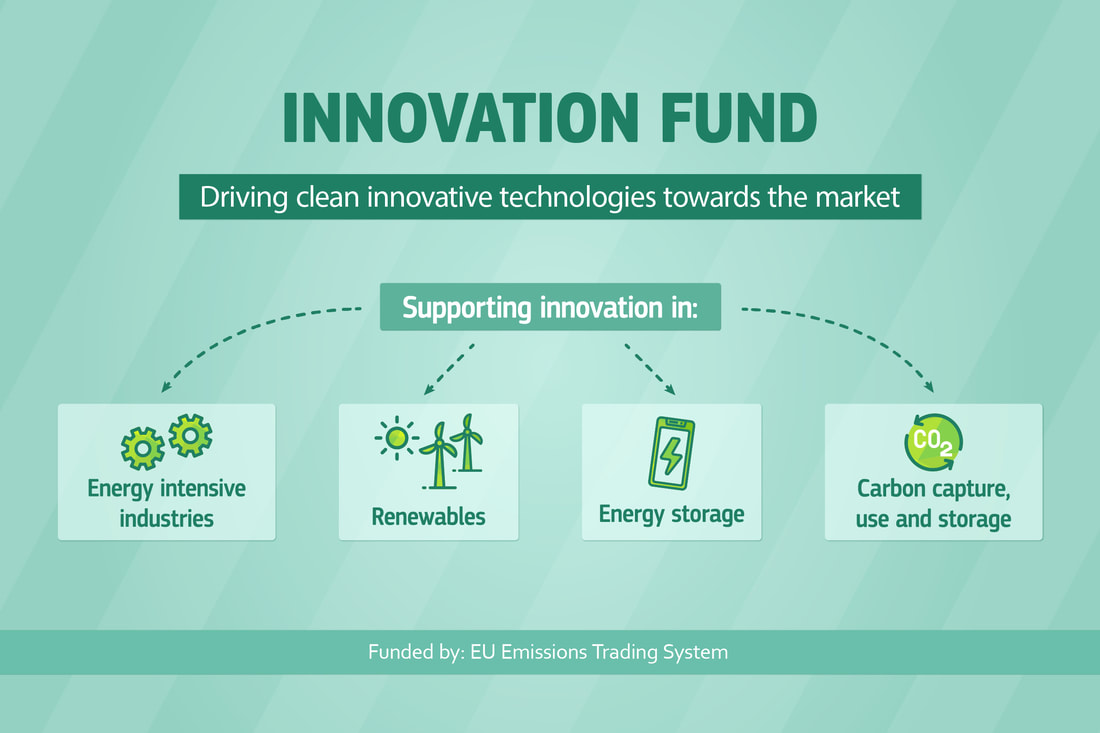INNOVFUND
The Innovation Fund, a major European Union initiative to support innovative low-carbon technologies, remains a key financing instrument for the EU's climate goals. Managed by the European Commission and the European Climate, Infrastructure and Environment Executive Agency (CINEA), the Innovation Fund aims to provide substantial financial support for projects that can significantly reduce greenhouse gas emissions.
Current Status
As of 2024, the Innovation Fund continues to operate with an expanded budget and scope following revisions to the EU Emissions Trading System (ETS) Directive.
The fund's size has been increased to approximately 530 million ETS allowances, translating into an estimated €40 billion in funding from 2020 to 2030, contingent on carbon prices (EUCIEEA) (Climate Action).
Recent and Upcoming Calls
The latest call for proposals, known as the IF23 Call, was launched on 23 November 2023 and closed on 9 April 2024. This call focused on net-zero technologies and had a total budget of €4 billion, covering various sectors including energy-intensive industries, cleantech manufacturing, and deep decarbonization pilot projects. Although this call is now closed, new calls are expected to be announced regularly (Climate Action) (EUCIEEA).
Application Process
The Innovation Fund accepts applications through competitive bidding procedures and regular calls for proposals. Projects are evaluated based on criteria such as greenhouse gas emissions avoidance, degree of innovation, project maturity, and cost efficiency.
Support and Resources
To assist potential applicants, the European Commission and CINEA provide extensive resources, including tutorials, webinars, and project development assistance. Detailed information about eligibility, application requirements, and support mechanisms can be found on the Innovation Fund's official Climate Action website.
The Innovation Fund continues to be a pivotal mechanism in advancing Europe's transition to a low-carbon economy, supporting groundbreaking projects and fostering technological innovation across the continent.
The fund's size has been increased to approximately 530 million ETS allowances, translating into an estimated €40 billion in funding from 2020 to 2030, contingent on carbon prices (EUCIEEA) (Climate Action).
Recent and Upcoming Calls
The latest call for proposals, known as the IF23 Call, was launched on 23 November 2023 and closed on 9 April 2024. This call focused on net-zero technologies and had a total budget of €4 billion, covering various sectors including energy-intensive industries, cleantech manufacturing, and deep decarbonization pilot projects. Although this call is now closed, new calls are expected to be announced regularly (Climate Action) (EUCIEEA).
Application Process
The Innovation Fund accepts applications through competitive bidding procedures and regular calls for proposals. Projects are evaluated based on criteria such as greenhouse gas emissions avoidance, degree of innovation, project maturity, and cost efficiency.
Support and Resources
To assist potential applicants, the European Commission and CINEA provide extensive resources, including tutorials, webinars, and project development assistance. Detailed information about eligibility, application requirements, and support mechanisms can be found on the Innovation Fund's official Climate Action website.
The Innovation Fund continues to be a pivotal mechanism in advancing Europe's transition to a low-carbon economy, supporting groundbreaking projects and fostering technological innovation across the continent.
The EU Competitive Bidding Program
This is the instrument of the Innovation Fund to finance lnnovative low-carbon technologies.
European Hydrogen Bank Pilot Auction Results
The first EU-wide auction (IF23 Auction) for producing renewable fuel of non-biological origin (RFNBO) hydrogen was launched on 23 November 2023 and concluded on 8 February 2024. The auction garnered bids from 132 projects across 17 European countries.
The most recent public webinar on the European Hydrogen Bank's auction can be accessed via a recorded session.
Following a thorough evaluation, seven renewable hydrogen projects were selected to receive nearly €720 million in project support from the Innovation Fund. These projects will collectively cover 1.5 Gigawatts electric (GWe) of electrolyser capacity and produce a total of 1.58 million tonnes of RFNBO hydrogen over a decade.
The hydrogen produced by these projects will be utilized in sectors including steel, chemicals, maritime transport, and fertilizer production. The selected projects will employ either alkaline electrolysers, proton exchange membrane (PEM) electrolysers, or a combination of both technologies.
Out of the 132 bids, 119 proposals were deemed eligible and admissible. The European Climate, Infrastructure, and Environment Executive Agency (CINEA), the implementing body of the Innovation Fund, evaluated the projects and ranked them from the lowest to the highest bid. Support was awarded accordingly.
The submitted bids ranged from €0.37 to the ceiling price of €4.5 per kilogram of hydrogen produced. The seven selected projects had bid prices between €0.37 and €0.48 per kilogram of RFNBO hydrogen produced. Based on the pay-as-bid design of the pilot auction, these projects will receive Innovation Fund grants ranging from €8 million to €245 million.
European Hydrogen Bank Pilot Auction Results
The first EU-wide auction (IF23 Auction) for producing renewable fuel of non-biological origin (RFNBO) hydrogen was launched on 23 November 2023 and concluded on 8 February 2024. The auction garnered bids from 132 projects across 17 European countries.
The most recent public webinar on the European Hydrogen Bank's auction can be accessed via a recorded session.
Following a thorough evaluation, seven renewable hydrogen projects were selected to receive nearly €720 million in project support from the Innovation Fund. These projects will collectively cover 1.5 Gigawatts electric (GWe) of electrolyser capacity and produce a total of 1.58 million tonnes of RFNBO hydrogen over a decade.
The hydrogen produced by these projects will be utilized in sectors including steel, chemicals, maritime transport, and fertilizer production. The selected projects will employ either alkaline electrolysers, proton exchange membrane (PEM) electrolysers, or a combination of both technologies.
Out of the 132 bids, 119 proposals were deemed eligible and admissible. The European Climate, Infrastructure, and Environment Executive Agency (CINEA), the implementing body of the Innovation Fund, evaluated the projects and ranked them from the lowest to the highest bid. Support was awarded accordingly.
The submitted bids ranged from €0.37 to the ceiling price of €4.5 per kilogram of hydrogen produced. The seven selected projects had bid prices between €0.37 and €0.48 per kilogram of RFNBO hydrogen produced. Based on the pay-as-bid design of the pilot auction, these projects will receive Innovation Fund grants ranging from €8 million to €245 million.
The Innovation Fund is primarily managed and financed by the European Union through several key institutions:
1. European Commission
The European Commission oversees the strategic direction and overall management of the Innovation Fund. It sets the priorities, allocates the budget, and ensures that the fund aligns with the EU's climate and energy policies (Climate Action).
2. European Climate, Infrastructure and Environment Executive Agency (CINEA)
CINEA is responsible for the implementation and administration of the Innovation Fund. This includes managing the calls for proposals, evaluating applications, and monitoring the progress of funded projects. CINEA acts as the main point of contact for applicants and beneficiaries of the fund (Climate Action) (EUCIEEA).
3. European Investment Bank (EIB)
The EIB plays a supportive role by providing financial expertise and co-financing opportunities. While it does not directly manage the Innovation Fund, it collaborates closely with the European Commission and CINEA to leverage additional funding and financial instruments that complement the Innovation Fund's objectives (Climate Action).
For more detailed information on the Innovation Fund and its managing institutions, you can visit the following links:
1. European Commission
The European Commission oversees the strategic direction and overall management of the Innovation Fund. It sets the priorities, allocates the budget, and ensures that the fund aligns with the EU's climate and energy policies (Climate Action).
2. European Climate, Infrastructure and Environment Executive Agency (CINEA)
CINEA is responsible for the implementation and administration of the Innovation Fund. This includes managing the calls for proposals, evaluating applications, and monitoring the progress of funded projects. CINEA acts as the main point of contact for applicants and beneficiaries of the fund (Climate Action) (EUCIEEA).
3. European Investment Bank (EIB)
The EIB plays a supportive role by providing financial expertise and co-financing opportunities. While it does not directly manage the Innovation Fund, it collaborates closely with the European Commission and CINEA to leverage additional funding and financial instruments that complement the Innovation Fund's objectives (Climate Action).
For more detailed information on the Innovation Fund and its managing institutions, you can visit the following links:




